UPDATED: Recollections of significant interactions with one of America’s most courageous men.

Daniel Ellsberg being arrested at Iraq war die-in San Francisco, March 19, 2007. (Steve Rhodes/Flickr, CC BY-NC-SA 2.0)
By Joe Lauria
Special to Consortium News
I first met Daniel Ellsberg, who died on Friday at 92, inside a House committee hearing room on Capitol Hill in 2006. It was a hearing about whistleblowers. We were both sitting towards the back of the sparsely attended room.
I don’t recall how we began speaking, but I had just returned from a trip to Vietnam and Dan voraciously questioned me about my experiences there. He wanted to know if I thought the motive for U.S. involvement had been economic or purely ideological. He didn’t know me from a hole in the wall. But that apparently was of no consequence to him.
Among his many supremely, human traits was that as a man as famous as he had become, he didn’t succumb to the awful, unapproachable egoism that well-known people can bestow on themselves. There are many journalists speaking or writing now about their experiences with Dan. That’s because he was open to any serious person who had a curiosity about the things that intensely interested him.
Later that year, in 20o6, I was invited to a 35th anniversary dinner at the Mayflower Hotel in Washington to commemorate the passing of the Pentagon Papers from Ellsberg to Senator Mike Gravel in 1971.
I only briefly spoke with Dan that night, but a year later I had a book contract to tell Gravel’s story. Mike had become a candidate for the 2008 Democratic presidential primary. Dan agreed to write the foreword to the book (and pointed out how many people mistakenly called it a “forward” instead of “foreword”). As he was a major part of Gravel’s story I interviewed him for the book.
During one interview I was on the phone with Dan in an empty Amtrak train headed to Washington. In the distance, at the other end of the car, a guy was standing who looked exactly like the arch-neocon Bill Kristol. I told Dan. He said, “If you talk to him tell him ‘Fuck you from Dan Ellsberg.” But we returned to the interview.
I regret not going up to the guy to ask him if he was Kristol. If he was, I would have handed him the phone and told him I have Dan Ellsberg on the line and he has something he wants to tell you. (I especially regret it after John Kiriakou’s story in CN about Ellsberg.)

Dan Ellsberg, Whitney Stewart Gravel with Mike Gravel at 35th anniversary of the transfer of the Pentagon Papers, June 2006. (Joe Lauria)
Ellsberg told me he had gone in 1971 to several senators, including George McGovern, who was running for president, asking them to read the Pentagon Papers into the Congressional Record because they had constitutional immunity. They all chickened out.
Dan told me he initially thought that if a senator read the Papers in Congress then the newspapers would report on it, and what he was revealing would become known. But then he figured out it happens the other way around: the Senate actually reacts to the press, not the press to the Senate.
So he leaked the Papers to The New York Times. After just two days, the Nixon Department of Justice shut down publication on June 15, 1971. The Times had published very little of the 7,000-page study in the two days before the injunction. On the very next day, Ellsberg arranged to send the Papers to Gravel, the only senator who had the guts to take them and read them into the record.
Ellsberg had learned that Gravel was conducting a filibuster to stop renewal of the military draft and he called Gravel, asking him if he wanted a copy of the Pentagon Papers.
They made an arrangement whereby Ellsberg, who was hiding out from the F.B.I. in a motel in Cambridge, MA, gave copies of the Papers, bound by a dog’s leash, to Ben Bagdikian, then an editor at The Washington Post. One copy was for the Post and one for Gravel.
Bagdikian, who said he felt uncomfortable as a journalist being a messenger to a U.S. senator, bought two seats on a flight from Boston to Washington. One seat was for him, and the other for the Papers.
Bagdikian and Gravel met in front of the Mayflower Hotel a few blocks from the White House, where they transferred the Papers from Bagdikian’s car to Gravel’s. Then they went inside to have a drink, as Gravel told me, as though nothing special had happened.
Gravel then spent days cutting off “Top Secret” from each page. Ellsberg surrendered at a federal courthouse in Boston on June 28, 1971. The next day Gravel brought the Papers onto the Senate floor to read them as part of his filibuster. A suspicious Republican senator figured Gravel he was up to something, seeing a big flight bag next to his desk.
In fact one Democratic senator, Ed Muskie, came over and jokingly asked Gravel on the Senate floor, “What the hell do you have there Mike, the Pentagon Papers?” And indeed he did.
But the Republican senator called for a quorum vote and it failed. So Gravel went to plan B and convened a hearing in the Capitol basement. There he read the Papers over several hours on national TV, broke down in tears, and put the rest into the record.
The next morning the U.S. Supreme Court lifted the DOJ’s prior restraint and publication in the newspapers resumed.
It was from Ellsberg that I learned the little known fact that the Nixon DOJ empaneled a grand jury in Boston to prosecute New York Times reporters under the Espionage Act for publishing the top secret material (just as the Trump and now the Biden administration is trying to do to Assange.)
The grand jury collapsed when it became known that the F.B.I. had wiretapped Ellsberg’s phones, meaning the government had also listened in on the Times reporters. That was part of the prosecutorial misconduct that led to a mistrial of Ellsberg’s Espionage Act prosecution and to his freedom.
In 2018 I interviewed Ellsberg and Gravel about these events:
In the foreword to my book with Gravel, Ellsberg wrote this about where he got his courage from:
“At the height of the Vietnam War, in the late summer of 1969, I met young American draft resisters who were on their way to prison. Their example put the question in my mind: ‘What could I do to help end this war if I’m ready to go to prison for it?’ If they could do this, I thought, I could do it. That kind of courage was contagious.'”
“I had participated in a terrible, indecent fraud in Vietnam that had lied us into continuing and escalating a hopeless and wrongful war — something that was reproduced when the United States invaded Iraq in March 2003 and could happen again in Iran if we do not stop it now. I thought, in the fall of 1969, that by exposing the secret history of Vietnam, it might help to get us out of that terrible war.”
“My message to such officials is this: ‘Don’t do what I did. Don’t wait until the war has begun and the engine of war is unstoppable. Before the war or the next escalation, consider accepting the personal risk of exposing lies and revealing the truth to the public through the press and the Congress, with documents.'”
It was a message Dan repeated many times, including when he was awarded the Sam Adams prize on April 11 at Dan’s home in California. “Do what I wish I had done in ’64, not what I waited till ’69 and ’71 to do. Act like Katharine Gun and Ed Snowden and Tom Drake, Bill Binney, and many others on the list of Sam Adams awardees, in particular, Ed Snowden and Julian Assange,” he said (video).
When other men might tire of life, Dan persevered until the end in his defense of whistleblowers like Tom Drake, who warned about illegal mass surveillance at the NSA; Edward Snowden, who leaked the files proving it; John Kiriakou, who blew the whistle on the C.I.A. torture program; and Chelsea Manning, who made the Iraq and Afghan war files as well as the Diplomatic Cables available to WikiLeaks.
Ellsberg spoke out into his ninth decade. He wrote four important books, wrote countless articles, appeared at protests (where he was arrested several times), on television and webcasts, including numerous times on Consortium News‘ CN Live!, where he defended the only publisher and journalist ever charged under the Espionage Act — Julian Assange.
When I reported the testimony from Spanish witnesses read in Assange’s extradition hearing in September 2020, revealing for the first time that the C.I.A. had plotted to kidnap or poison Assange, Dan sent me a message expressing cautious optimism, saying this was worse than what had happened to him during his case, which led to a mistrial and his freedom. On Oct. 1, 2020, he wrote in an email:
“These sworn allegations, by expert witnesses, if true (they reported being able to supply voluminous documentary and video evidence) imply that the CIA in the Trump Administrations carried out crimes — including illegal surveillance (in this case, of Assange’s interactions with his lawyers) and consideration of poisoning him in the Ecuador Embassy — which correspond closely to the Nixon administration crimes against me whose exposure during my trial led to dismissal of charges against me and Tony Russo, and to impeachment hearings that forced Nixon’s resignation.
So far, these explosive revelations (like the whole four weeks of testimony) remain uncovered by the NYT and the Washington Post (one AP story a day late). (Wild contrast to the press reaction to exactly comparable revelations toward the end of my trial 47 years ago). Historic. What comes of them…is a major test (alongside all the others) of the state of our republic today.”’
He then sat for this interview with us on the topic:
With the prospect of Assange’s extradition to the U.S. as early as this week, this test of the state of the U.S. republic appears to be failing miserably. In the days or weeks before he may be sent to face espionage charges for revealing U.S. war crimes, Julian Assange has now lost his most prominent and fiercest advocate.
And the world has lost one of its greatest advocates for peace.
Dan appeared on our show numerous other times to discuss Assange. He also sat down with GCHQ whistleblower Katharine Gun on CN Live! on Sep. 27, 2019, shortly after the release of Official Secrets, a feature film about Gun’s leaking of documents showing how the U.S. was spying on members of the U.N. Security Council to pressure them for their vote to authorize the invasion of Iraq. It was an effort that failed.
In March 2019, I visited Dan in his Bay Area home with its spectacular view of the bay. We talked in depth about the Espionage Act as I was working on a piece about it in relation to the Official Secrets Act and Assange.
We also disagreed about the Mueller investigation and whether it had conclusively proved that Russia hacked the DNC. (Since the WikiLeaks publications of those documents, not oral statements, were totally accurate, it was information about the election that was being spread, not disinformation. Thus ultimately, the source is irrelevant.) I disagreed with Dan that Mueller had proven anything, given that his indictment would never be tested in court.
Dan was a loyal Democrat, on the left-wing of the party to be sure. But since the 1990s it has no longer been FDR’s party, moving to the center-right. Since 2016, neocons have migrated there from the Republican Party. I was disappointed that Dan, like Noam Chomsky, did not take a stand against both parties, particularly on foreign policy, where they are indistinguishable in their promotion of war to further U.S. imperial interests — something Dan certainly opposed.
The last time I saw Dan — not on a computer screen — was at a birthday dinner in Maryland in 2019. He virtually cornered me in the kitchen, where I was attempting to eat some of the leftovers, trying to convince me the U.S. had a two-party system and there was no choice but to support the Democrats.
He was uncomfortable being a “hero,” because he believed he just did what he was supposed to do, and especially because more recent whistleblowers like Manning and Snowden were considered traitors.
Because he put the vital subjects that mattered most to him before himself — nuclear weapons, illegal surveillance, the First Amendment or Julian Assange — it was never about Dan Ellsberg. For him it was about the issues threatening the republic, indeed even humanity.
That stood out starkly in this increasingly narcissistic, social-media age. He was kind and unassuming and accepted anyone into his orbit who had a legitimate thing to say. And that is why it was such a privilege for me, as for countless others, to have known him.
Joe Lauria is editor-in-chief of Consortium News and a former U.N. correspondent for The Wall Street Journal, Boston Globe, and numerous other newspapers, including The Montreal Gazette and The Star of Johannesburg. He was an investigative reporter for the Sunday Times of London, a financial reporter for Bloomberg News and began his professional work as a 19-year old stringer for The New York Times. He can be reached at joelauria@consortiumnews.com and followed on Twitter @unjoe



Bet he’d be for a third party. Listening to RFK,Jr. supporting a duopoly. Wonder what Ellsberg, that beautiful man/human being would have to say about a third party. JFK, JR. is so Camelot and Camelot has never worked for most of us. Are we really supposed to be “middle” class, but what is that “middle” and what class is that that harbors its advantages from the suffering of others. There’s enough richness in the world that we don’t need anyone but true leaders, leaders that understand what kind of leaders led the people of the indigenous tribes of this nation and what wrong European ways were brought to this nation. We truly need a nation of our own and that nation will be rock anchored if it were anchored to the indigenous of this nation and ourselves and not in a shallow way.
Thank you, Joe, for making this piece honest, and not just hagiography. (Referring to Ellsberg’s support of the Democratic Party.) It’s more real and inspiring that way.
Agree!
“Journalists, Whistleblowers and Defenders of the Right to Information,” aka HEROES!?!
This American tune, HERO,” goes out to “our” HEROES! Most do NOT wannabe saddled w/that label,, “They just wanna walk & fight like everyone else.”
“Let me go. I don’t want to be your hero. I don’t want to be a big man. Just wanna fight like everyone else. Your masquerade. I don’t want to be a part of your parade. Everyone deserves a chance to walk with everyone else.
While holding down, a job to keep my girl around; and, maybe buy me some new strings; and, her & I out on the weekend.
AND, we can whisper things. Secrets from my American dreams. Baby, needs some protection; but, I’m a kid like everyone else. I don’t wanna be a hero. I don’t want to be a big man. Just wanna fight like everyone else!!!!” (Family of The Year) Ten years later, “HERO,” rocks!!!
hxxps://m.youtube.com/watch?v=_CvBLW0N1b4&pp=ygUXSGVybyBmYW1pbHkgb2YgdGhlIHllYXI%3D
AND, how difficult it gets, anymore, to read the papers w/o a box of tissues @ my side. Knowing, “Needed, Solidarity NOT Tears.” However, imo, sorrow, dread, & tears is a natural reaction to Dan Ellsberg’s death, his son advising, via Politico, 6.4.23, this would be Ellsberg’s last interview, followed by Joe Lauria’s “Knowing Dan Ellsberg,” personally. Written w/reverence, joy, love. “What the World Needs Now!” Peace. Love. The Power to STOP The Empire from extraditing Julian Assange & killing The First Amendment. Right?!? May Dan Ellsberg R.I.P., eternally, “Let me go,” in peace; AND, never, ever forgotten!!
My most favorite photos of Dan Ellsberg, 1) Dan & his “Closest Friend’, his Wife, Patricia, “In 1973, Daniel Ellsberg embraces his wife Pat as they emerge from the federal building in Los Angeles shortly after the trial judge in the Pentagon Papers case dismissed all espionage, theft and conspiracy charges against Ellsberg and his co-defendant. | AP Photo hxxps://www.politico.com/news/magazine/2023/06/04/daniel-ellsberg-final-advice-00099639
2) Dan Ellsberg, @ DC’s Belmarsh Tribunal, JANUARY 22, 2023, “Ellsberg: Losing 1st Amendment Reverses War of Independence. Daniel Ellsberg says using the Espionage Act against journalist Julian Assange in blatant violation of the First Amendment means the First Amendment is essentially gone. https://consortiumnews.com/2023/01/22/ellsberg-losing-1st-amendment-reverses-war-of-independence/
“Hi, I’m Dan Ellsberg. One of the foundation stones of our government here in the United States, for democracy and a republic, is our First Amendment to the Constitution, which forbids any law by Congress or the states abridging freedom of speech or of the press, along with freedom of religion or of assembly, that precluded the passage of a British type Official Secrets Act, which most countries have.” (1.22.23)
This photo of Dan Ellsberg, a live stream, Ellsberg speaking up, looking so handsome & healthy, always reminds me of my Father (Dad), who @ 52, died from the same f/cancer, in the same amount of time; but, my neighbor @ 93, lived w/pancreatic cancer for almost one year. The best, like my father & my neighbor, Daniel Ellsberg, 92, “had a strong foundation when the the winds of change, shifted;” and, NOT a hint of dementia/senility plagued his/her life!!!
Onward & upwards. “The fuel of the light is consumed, yet it provides light for others.” Imo, Joe Lauria, CN, et al., “GOT” gold, inside of them; and, they “GOT” wheels, turning inside them, too!” TY. “KEEP IT LIT!”
Wonderful, and informative remembrance, Joe. Thank you!
On Ellsberg’s “don’t wait …. like I did until ’69 and ’71”: Little know fact is that it is Ellsberg who leaked the information to the Times in March, ’68, after the disaster of the TET Offensive, that General Westmoreland had hid the CIA’s estimate of the North Vietnam’s number of the soldiers under arms. This led directly to President Johnson cancelling the planned INCREASE of American soldiers of over 200,000, and a few days later Johnson’s decision not to run for reelection. How many more thousands of deaths – American and Vietnamese – would have occurred had that escalation taken place. Hmmm……escalation, sound familiar in our current debacle?
That’s interesting Larry. It’s somewhat like when i hear people say if the US hadn’t dropped the bombs on Hiroshima and Nagasaki when they did, then more people would have died.
(I’m sure the people of those cities would have been delighted to know that.)
Escalation is determined on many things. Each side has its “raison d’être”. Let us hope we can keep atomic weapons out of the escalation.
That is right. Fear of popular reaction led Johnson to reject the request for an extra 200,000 troops.
I believe that his decision to step down was genuine at the time that he made it. He probably thought that his friend and ally, Nelson Rockefeller, would likely be the Republican nominee and would keep his darkest secrets safe if he became president.
“I was disappointed that Dan, like Noam Chomsky, did not take a stand against both parties, particularly on foreign policy, where they are indistinguishable in their promotion of war to further U.S. imperial interests.”
Excellent point Mr. Lauria.
Yes, I have to agree here with the disappointment about that. Daniel and Chomsky were mistaken, but I somehow attribute that to their age and their generation. They still weren’t ready to throw in the towel over the capitalist system’s two-party hoax. I forgive Daniel, especially, for this error./
Marvellous article and videos. Thankyou Mr. Lauria. Awaiting any further developments and hoping with all my heart a last minute reprieve for Julian Assange will be forthcoming; ECHR.
FREE JULIAN ASSANGE.
Thank you for sharing those memories and for all the great work CN has done reporting on the same issues that Daniel Ellsberg cared about most deeply.
Noteworthy is your fundamental disagreements with him about the Mueller Report & his attachment to Democratic Party politics. We all have our biases.
And isn’t it more than a little ironic that under today’s rules of infighting, his views about party duopoly & Russian “hacking”, were he anyone else, automatically would disqualify him from having any perspective to be taken seriously about anything in many quarters, or so it would seem? Imagine losing such a valiant ally with such “foolishment”.
Imagine Secretary of State Colin Powell failing to resign his post (Joe Lauria, “Powell & Iraq—How One Resignation May Have Stopped the Disastrous Invasion,” Consortium News, October 18, 2021), and Senator Dick Durbin unconscionably clamming up in the face of the gaping narrative discrepancies to which he was privy (“Durbin Kept Silent on Prewar Knowledge,” The Washington Times, April 27, 2007), unnecessarily repeating the cowardly legacies of past personages such as Robert McNamara and J. William Fulbright who stifled their latent misgivings about the rationale for and conduct of a previous war until it was too late to accomplish anything meaningful, rather than following the far more courageous (if also belated) examples of Daniel Ellsberg, Anthony Russo, and Senator Mike Gravel, even when those latter figures’ actions (and those former past policymakers’ failings) were dramatized before viewers’ eyes in a Rod Holcomb-directed FX film adaptation of “The Pentagon Papers” featuring James Spader and Paul Giamatti that aired ten days prior to the commencement of Coalition combat operations against Ba’athist Iraq.